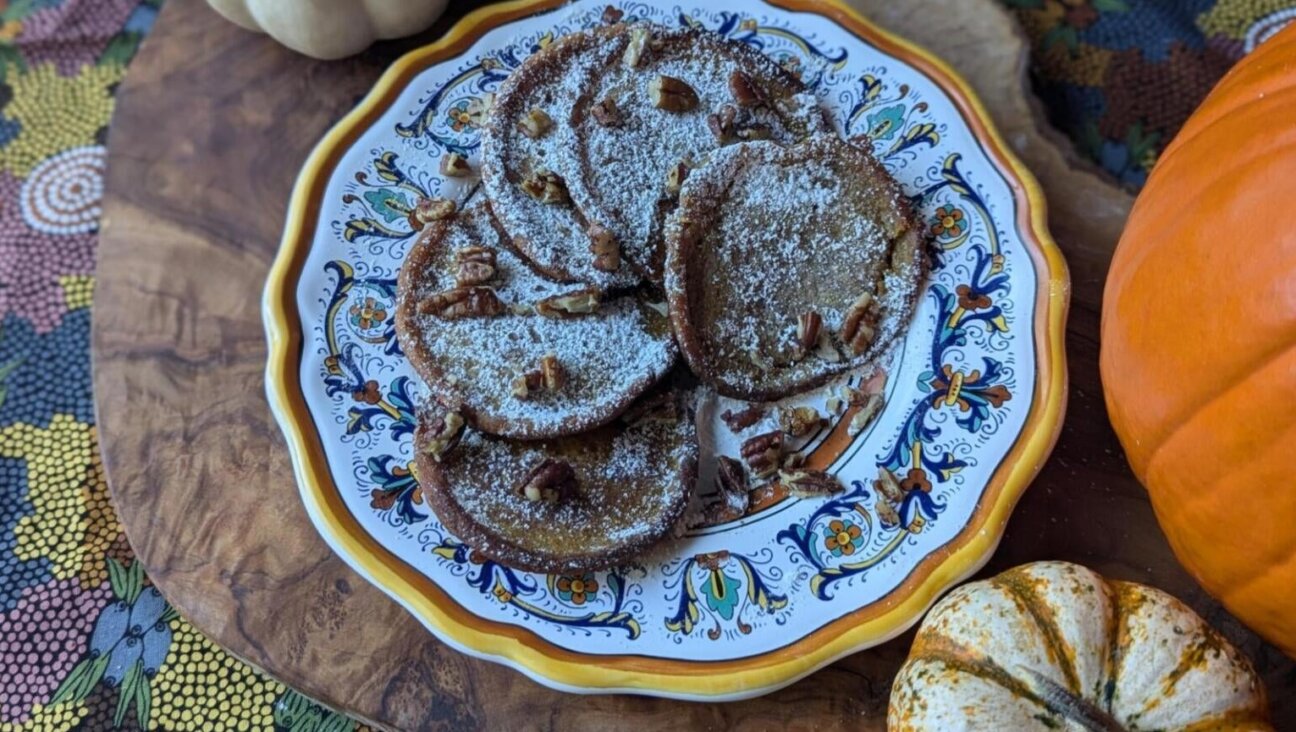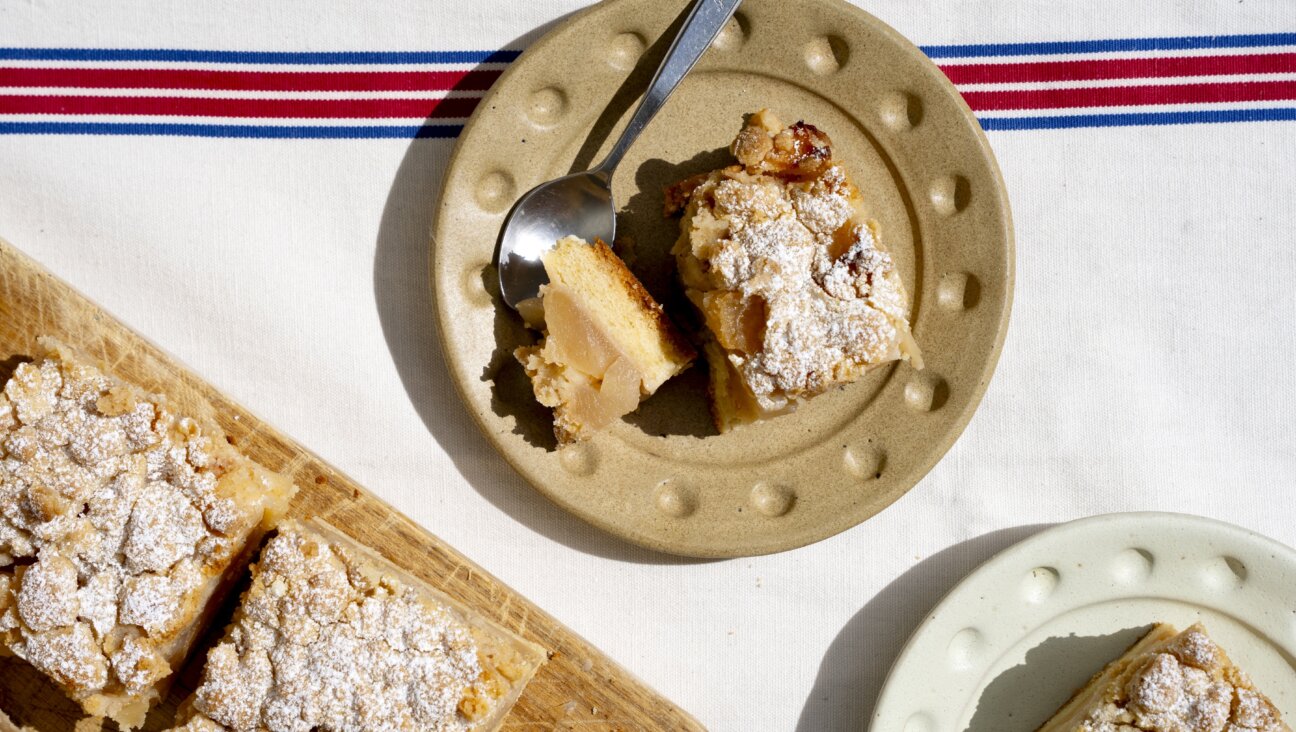Healthy Hanukkah? Yes, It’s Possible

Image by Photo by: Jackie Topol
Hanukkah often feels like a week-long calorie splurge. Between the fried latkes, sufganiyot (Hebrew for doughnuts), and chocolate gelt, the extra calories can really add up quickly in our diets. But maybe there’s a way to enjoy the holiday’s celebration of oil and sweets a bit more healthfully? Indeed there is!
Resist the urge to deep fry. Try a baked latke recipe, and if you really are craving that extra crispiness achieved from frying, pan-fry them in a small amount of oil and then finish them off by baking in the oven.
Pack in some fiber. Instead of using white flour, use whole wheat flour to get some extra fiber into your latkes. You can also mix in other vegetables into your potato latkes, like zucchini, carrots, and parsnips, to boost the fiber and antioxidant content.
Easy does it on the salt. Enhance the flavor of your latkes by adding in herbs and spices and go light on the salt, which will cause you to retain water and can increase your blood pressure. Last year I made a sweet potato latke with ras-el-hanout (an incredible Moroccan spice blend), and the year before I made a tricolor latke with rosemary.
Swap out the sour cream. Go for low-fat or fat-free sour cream instead of full-fat to save precious calories. Better yet, try tangy Greek yogurt, which offers significantly more protein.
Go for all natural applesauce. Regular applesauce is very high in sugar and often contains high fructose corn syrup, so reach for a natural no-sugar-added variety. If you have the time, you can even make your own.
Play driedel with pennies. Though it’s fun to play driedel with chocolate gelt, try using another non-food treat like pennies, poker chips (for adults), or stickers (for kids).
Bake your sufganiyot. – One of my favorite things to do is find alternatives to traditionally unhealthy food, so I developed a baked version of sufganiyot, a food that Hanukkah would not be complete without. Though they don’t commemorate the miracle of the oil lasting eight days, these sufganiyot are so good that they taste like the real thing and they will enhance any Hanukkah celebration! You’ll find the recipe below!
By combining all these tips, you’ll be able to have a healthy, guilt-free Hanukkah celebration!
Mini Sufganiyot with Cinnamon-Sugar-Jam Glaze
Recipe by Jackie Topol
These bite-size baked doughnuts are topped with a glaze reminiscent of the jelly filling in traditional sufganiyot and are a fraction of the calories compared to the fried versions. They also happen to be vegan.
Personally, I love vegan baking for several reasons: (1) the dish is pareve, so it can be served with anything; (2) there’s no dairy involved, which could be an issue for those who are lactose intolerant or allergic; (3) there’s no raw egg, so you can taste the batter (especially helpful if baking with kids); and (4) there’s zero cholesterol in it (since cholesterol is only found in animal products). One more reason to get excited over this recipe: it’s a snap to make!
Most of the ingredients you probably already have in your home. If you don’t have Ener-G egg replacer, you can find it at any health food store. I also recommend using a non-stick mini doughnut pan for this recipe. You can find them at most specialty kitchen/home goods stores or online.
Makes 24 mini donuts
Ingredients
Wet ingredients:
1/2 cup vanilla soy milk
1 teaspoon apple cider vinegar
1 teaspoon vanilla extract
1 1/2 teaspoons Ener-G egg replacer mixed with 2 tablespoons of water (= 1 egg)
3 tablespoons canola oil
1/2 cup agave nectar
Dry ingredients:
1 1/4 cup all-purpose flour
3/4 teaspoon baking powder
1/4 teaspoon salt
1/4 teaspoon nutmeg
1/2 teaspoon cinnamon
Glaze ingredients:
2 tablespoons seedless jam (any kind of berry flavor will work)
1 tablespoon maple syrup
2 tablespoons sugar
1 teaspoon cinnamon
Directions:
1. Preheat oven to 350º F.
-
Place the soy milk in a mixing bowl and add the apple cider vinegar. Whisk the two ingredients together and let sit for about 5 minutes, until the mixture slightly curdles. Next incorporate the remaining wet ingredients and mix again. Set aside.
-
In a separate large bowl mix together the dry ingredients. Slowly pour in the wet ingredients to the dry ingredients and whisk well until there are no lumps.
-
Using a spatula, spoon the batter into a large ziplock bag. Cut off one corner from the bottom of the bag to create a small hole. This will enable you to pipe the batter into the doughnut pan easily.
-
Squeeze the batter slowly into each doughnut round, making sure not to fill more than 1/2 of the way. (If you overfill it, your doughnuts will be lopsided and one side will not have a hole! They’ll still taste good, but won’t really look like doughnuts.) Using your fingers, smooth out the top of the dough so that it’s even, making sure not to cover up the doughnut hole with batter.
-
Bake the doughnuts for about 12 minutes. Carefully remove the doughnuts from the oven and allow to cool slightly before glazing.
-
While the doughnuts are cooling, make the glaze and cinnamon-sugar topping. First, mix the jam and maple syrup together in a small bowl. Using a pastry brush, spread a thin layer of glaze on top of each doughnut. Finally mix together the sugar and cinnamon in a separate small bowl and then dip the glazed part of the doughnut into the cinnamon-sugar mixture. Place the finished doughnuts on a platter and serve!
Nutrition facts (per mini doughnut): 72 calories, 2 g fat, 0 g cholesterol, 26 mg sodium, 13 g carbohydrates, 1 g fiber, 6 g sugar, 1 g protein.
Wishing you a Happy Hanukkah that’s filled with sweet treats! Enjoy!
Jackie Topol is a certified holistic health counselor and is a Masters candidate in Clinical Nutrition at NYU. She is currently completing her dietetic residency at NY-Presbyterian Hospital and will be a Registered Dietitian in the very near future. Jackie also has been teaching health-focused [cooking classes] (http://www.jccmanhattan.org/culinary-arts) at the JCC in Manhattan for the past 4 years. Her career has been greatly inspired by her experiences at Adamah, where she was a Fellow in 2007.
















